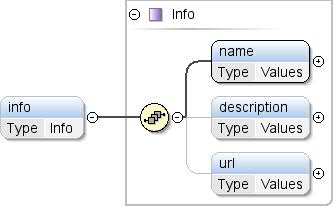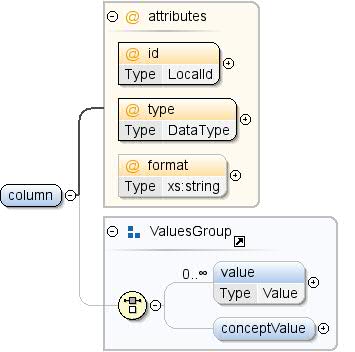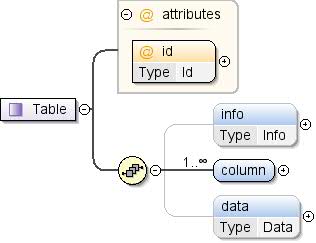Komponente: Tabelle
Mit Sammlungen den Überblick behalten
Sie können Inhalte basierend auf Ihren Einstellungen speichern und kategorisieren.
Element: Tabelle / info
| Namespace |
http://schemas.google.com/dspl/2010 |
| Annotationen |
Textinformationen zur Tabelle. |
| Diagramm |
 |
| Typ |
Info |
| Attribute |
| content: |
komplex |
| minOccurs (Mindestanzahl): |
0 |
|
| Modell |
name , description{0,1} , url{0,1} |
| Children |
Beschreibung, Name, url |
| Instanz |
<info>
<name>{1,1}</name>
<description>{0,1}</description>
<url>{0,1}</url>
</info>
|
| Quelle |
<xs:element name="info" type="Info" minOccurs="0">
<xs:annotation>
<xs:documentation>Textual information about the table.</xs:documentation>
</xs:annotation>
</xs:element>
|
Element: Tabelle / Spalte
| Namespace |
http://schemas.google.com/dspl/2010 |
| Annotationen |
Die Spezifikation einer Spalte in der Tabelle. |
| Diagramm |
 |
| Attribute |
| content: |
komplex |
| maxOccurs: |
unbegrenzt |
|
| Modell |
Wert* | conceptValue{0,1} |
| Children |
conceptValue, Wert |
| Instanz |
<column format="" id="" type="">
<value lang="">{0,unbounded}</value>
<conceptValue concept="">{0,1}</conceptValue>
</column>
|
| Attribute |
| QName |
Typ |
Behoben |
Standard |
Verwenden |
Annotation |
| format |
xs:string |
|
|
optional |
Format für die Spalte, das zum Parsen eines
Darstellung der Werte. Datumsformate werden definiert durch:
http://joda-time.sourceforge.net/api-release/org/joda/time/format/DateTimeFormat.html |
| id |
LocalId |
|
|
erforderlich |
Die Kennzeichnung der Tabellenspalte. |
| type |
DataType |
|
|
erforderlich |
Der Datentyp der Tabellenspalte. Alle Werte der
Spalte in der Tabelle muss diesem Datentyp entsprechen. |
|
| Quelle |
<xs:element name="column" maxOccurs="unbounded">
<xs:annotation>
<xs:documentation>The specification of a column in the table.</xs:documentation>
</xs:annotation>
<xs:complexType>
<xs:group ref="ValuesGroup" minOccurs="0">
<xs:annotation>
<xs:documentation>A constant value for the column.</xs:documentation>
</xs:annotation>
</xs:group>
<xs:attribute name="id" type="LocalId" use="required">
<xs:annotation>
<xs:documentation>The identifier of the table column.</xs:documentation>
</xs:annotation>
</xs:attribute>
<xs:attribute name="type" type="DataType" use="required">
<xs:annotation>
<xs:documentation>The data type of the table column. All values of the
column in the table must conform to this data type.</xs:documentation>
</xs:annotation>
</xs:attribute>
<xs:attribute name="format" type="xs:string" use="optional">
<xs:annotation>
<xs:documentation>A format for the column, used to parse a textual
representation of the values.
Date formats are defined by:
http://joda-time.sourceforge.net/api-release/org/joda/time/format/DateTimeFormat.html</xs:documentation>
</xs:annotation>
</xs:attribute>
</xs:complexType>
</xs:element>
|
Element: Tabelle / Daten
| Namespace |
http://schemas.google.com/dspl/2010 |
| Annotationen |
Datenquelle, in der Daten für die Tabelle
gefunden. |
| Diagramm |
 |
| Typ |
Daten |
| Attribute |
| content: |
komplex |
| minOccurs (Mindestanzahl): |
0 |
|
| Modell |
file |
| Children |
file |
| Instanz |
<data>
<file encoding="utf-8" format="csv">{1,1}</file>
</data>
|
| Quelle |
<xs:element name="data" type="Data" minOccurs="0">
<xs:annotation>
<xs:documentation>A data source where data for the table can be found.</xs:documentation>
</xs:annotation>
</xs:element>
|
Komplexer Typ: Tabelle
| Namespace |
http://schemas.google.com/dspl/2010 |
| Annotationen |
Eine Tabelle enthält Daten für das Dataset. Eine Tabelle kann Daten liefern
für ein Konzept oder ein Stück. |
| Diagramm |
 |
| Verwendet von |
|
| Modell |
info{0,1} , Spalte+ , Daten{0,1} |
| Children |
Spalte, Daten, Informationen |
| Attribute |
| QName |
Typ |
Behoben |
Standard |
Verwenden |
Annotation |
| id |
ID |
|
|
erforderlich |
Die eindeutige Kennung der Tabelle im
Dataset. |
|
| Quelle |
<xs:complexType name="Table">
<xs:annotation>
<xs:documentation>A table provides data for the dataset. A table may provide data
for a concept or for a slice.</xs:documentation>
</xs:annotation>
<xs:sequence>
<xs:element name="info" type="Info" minOccurs="0">
<xs:annotation>
<xs:documentation>Textual information about the table.</xs:documentation>
</xs:annotation>
</xs:element>
<xs:element name="column" maxOccurs="unbounded">
<xs:annotation>
<xs:documentation>The specification of a column in the table.</xs:documentation>
</xs:annotation>
<xs:complexType>
<xs:group ref="ValuesGroup" minOccurs="0">
<xs:annotation>
<xs:documentation>A constant value for the column.</xs:documentation>
</xs:annotation>
</xs:group>
<xs:attribute name="id" type="LocalId" use="required">
<xs:annotation>
<xs:documentation>The identifier of the table column.</xs:documentation>
</xs:annotation>
</xs:attribute>
<xs:attribute name="type" type="DataType" use="required">
<xs:annotation>
<xs:documentation>The data type of the table column. All values of the
column in the table must conform to this data type.</xs:documentation>
</xs:annotation>
</xs:attribute>
<xs:attribute name="format" type="xs:string" use="optional">
<xs:annotation>
<xs:documentation>A format for the column, used to parse a textual
representation of the values.
Date formats are defined by:
http://joda-time.sourceforge.net/api-release/org/joda/time/format/DateTimeFormat.html</xs:documentation>
</xs:annotation>
</xs:attribute>
</xs:complexType>
</xs:element>
<xs:element name="data" type="Data" minOccurs="0">
<xs:annotation>
<xs:documentation>A data source where data for the table can be found.</xs:documentation>
</xs:annotation>
</xs:element>
</xs:sequence>
<xs:attribute name="id" type="Id" use="required">
<xs:annotation>
<xs:documentation>The unique identifier of the table in the dataset.</xs:documentation>
</xs:annotation>
</xs:attribute>
</xs:complexType>
|
| Namespace |
Kein Namespace |
| Annotationen |
Ein Format für die Spalte, das zum Parsen einer Textdarstellung verwendet wird
der Werte. Datumsformate werden definiert durch:
http://joda-time.sourceforge.net/api-release/org/joda/time/format/DateTimeFormat.html |
| Typ |
xs:string |
| Attribute |
| verwenden Sie zum Beispiel: |
optional |
|
| Quelle |
<xs:attribute name="format" type="xs:string" use="optional">
<xs:annotation>
<xs:documentation>A format for the column, used to parse a textual
representation of the values.
Date formats are defined by:
http://joda-time.sourceforge.net/api-release/org/joda/time/format/DateTimeFormat.html</xs:documentation>
</xs:annotation>
</xs:attribute>
|
| Namespace |
Kein Namespace |
| Annotationen |
Die Kennzeichnung der Tabellenspalte. |
| Typ |
LocalId |
| Attribute |
| verwenden Sie zum Beispiel: |
erforderlich |
|
| Attribute |
|
| Quelle |
<xs:attribute name="id" type="LocalId" use="required">
<xs:annotation>
<xs:documentation>The identifier of the table column.</xs:documentation>
</xs:annotation>
</xs:attribute>
|
| Namespace |
Kein Namespace |
| Annotationen |
Der Datentyp der Tabellenspalte. Alle Werte der Spalte in
muss die Tabelle diesem Datentyp entsprechen. |
| Typ |
DataType |
| Attribute |
| verwenden Sie zum Beispiel: |
erforderlich |
|
| Attribute |
| Aufzählung |
String |
|
| Aufzählung |
float |
|
| Aufzählung |
Ganzzahl |
|
| Aufzählung |
boolean |
|
| Aufzählung |
Datum |
|
| Aufzählung |
Konzept |
|
|
| Quelle |
<xs:attribute name="type" type="DataType" use="required">
<xs:annotation>
<xs:documentation>The data type of the table column. All values of the
column in the table must conform to this data type.</xs:documentation>
</xs:annotation>
</xs:attribute>
|
Attribut: Tabelle / @id
| Namespace |
Kein Namespace |
| Annotationen |
Die eindeutige Kennzeichnung der Tabelle im Dataset. |
| Typ |
ID |
| Attribute |
| verwenden Sie zum Beispiel: |
erforderlich |
|
| Attribute |
|
| Verwendet von |
|
| Quelle |
<xs:attribute name="id" type="Id" use="required">
<xs:annotation>
<xs:documentation>The unique identifier of the table in the dataset.</xs:documentation>
</xs:annotation>
</xs:attribute>
|
Erstellt mit dem
oXygen XML Editor
Sofern nicht anders angegeben, sind die Inhalte dieser Seite unter der Creative Commons Attribution 4.0 License und Codebeispiele unter der Apache 2.0 License lizenziert. Weitere Informationen finden Sie in den Websiterichtlinien von Google Developers. Java ist eine eingetragene Marke von Oracle und/oder seinen Partnern.
Zuletzt aktualisiert: 2025-07-25 (UTC).
[[["Leicht verständlich","easyToUnderstand","thumb-up"],["Mein Problem wurde gelöst","solvedMyProblem","thumb-up"],["Sonstiges","otherUp","thumb-up"]],[["Benötigte Informationen nicht gefunden","missingTheInformationINeed","thumb-down"],["Zu umständlich/zu viele Schritte","tooComplicatedTooManySteps","thumb-down"],["Nicht mehr aktuell","outOfDate","thumb-down"],["Problem mit der Übersetzung","translationIssue","thumb-down"],["Problem mit Beispielen/Code","samplesCodeIssue","thumb-down"],["Sonstiges","otherDown","thumb-down"]],["Zuletzt aktualisiert: 2025-07-25 (UTC)."],[],["Tables store dataset information, and they are uniquely identified by an ID. Each table can have optional textual information in its \"info\" section. Tables are comprised of columns and data. Columns require a unique ID, data type and optionally include a format to parse text values. Columns can be of various data types. The data section provides a file, with a specified encoding and format, as a source. Each column may define multiple values and an optional concept.\n"]]



